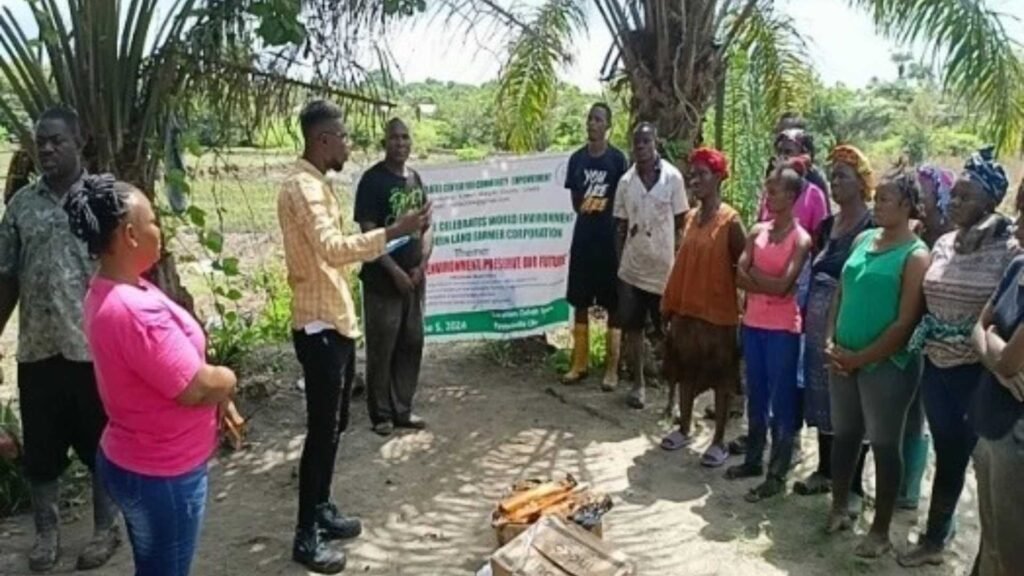In commemoration of World Environmental Day, the Rural Integrated Center for Community Empowerment (RICCE) strengthened the capacities of Green Land Farmers Corporation (GLFC), a local farmer group predominantly women, and the Coalition of Upliftment, Resilience, and Empowerment (CURE) on climate-smart agriculture practices that supports environmental sustainability and conservation.
In commemoration of World Environmental Day, the Rural Integrated Center for Community Empowerment (RICCE) strengthened the capacities of Green Land Farmers Corporation (GLFC), a local farmer group predominantly women, and the Coalition of Upliftment, Resilience, and Empowerment (CURE) on climate-smart agriculture practices that supports environmental sustainability and conservation.
The program was organized under the theme: “Nurturing Our Fields Preserving Our Future.” According to RICCE’s Monitoring, Evaluation, and Learning Officer and event Coordinator, Anderson Keah, other activities included tree planting, teaching farmers smart agriculture practices, emphasizing the importance of preserving the environment, and highlighting the role of women in environmental management and sustainability.
Mr. Keah further said the event culminated with the distribution of agricultural materials, including ten pairs of rain boots and ten pairs of hand gloves to the women’s group to buttress their efforts.
The program looks at four core objectives. They included: educating participants about the importance of environmental conservation and its impact on life and biodiversity, raising awareness among local rice farmers about sustainable farming practices and how they can promote environmental sustainability and conservation, motivating and engaging the community youth group on environmental protection initiatives and celebrating and recognizing the efforts of local farmers in practicing sustainable agriculture.
Stressing the importance of the theme, Mr. Keah highlighted the urgent need for environmental conservation; pointing out that deforestation, soil erosion, and water pollution directly threaten daily lives and the future, and called for immediate, collective action to protect the ecosystems, sustain agricultural productivity, and secure the health and livelihood.
He also stressed that the theme aligns with global efforts to combat climate change and environmental degradation.
The environmental expert provided an overview of what environmental conservation entails, explaining its various aspects and importance. Key definitions and concepts related to conservation and sustainability were introduced to ensure a clear understanding among all participants.
He emphasized the critical need for environmental conservation, presenting data and examples of current environmental issues such as deforestation, soil erosion, and water pollution. Mr. Keah further informed the participants of the immediate and long-term consequences of neglecting environmental conservation.
He also spoke of how unsustainable practices globally and specifically in Liberia contribute to climate change, biodiversity loss, human health, and environmental degradation directly affecting the livelihoods of the community, particularly local farmers who are mostly women.
Presenting on subsistence farming and environmental sustainability, Maryrose Jacobs, Gender Officer of RICCE challenged the farmers to engage in low-land farming to enhance their income and livelihood which supports environmental sustainability. Ms. Jacobs said environmental and biodiversity conversation requires shifting from upland farming (slash and burn) to environmentally friendly farming (lowland farming).
She also outlined the Impact of agricultural practices on local ecosystems indicating that when lowland is well developed, farmers farm all year round with multiple crop production and rotation. She encouraged the women to avoid the use of chemical fertilizers which deplicts the soil and practice the use of organic fertilizer which is less costly and supports soil fertility.
Some simple organic fertilizers that can boost lowland rice production include planting autumnal crops like beans, and groundnuts in the plots after harvesting the rice. She emphasized the importance of field management which includes weed and pest control, cleaning peripheral canals water control systems to boost production at all times.
Maryrose highlighted the connection between healthy ecosystems and agricultural productivity, pointing out how sustainable practices can enhance crop yields and food security.
The occasion was graced by Green Land Farmers Corporation, community leaders, RICCE staff, the Coalition of Upliftment, Resilience, and Empowerment (CURE) a community youth group, and other stakeholders.
The World Environment Day program concluded with RICCE’s presentation of safety rain boots and hand gloves to the farmer corporation and initiated the tree planting activities with the CURE; a local youth group along the river bank in the Zubah Town Community.
According to the group, the initiative aimed to control erosion, improve water quality, enhance biodiversity, and mitigate climate change impact. The activity provided educational opportunities for the youth and improved the aesthetic and recreational value of the riverbank.
Participating in the tree planting effort, CURE demonstrated its commitment to environmental conservation and set an example for ongoing community-led sustainability initiatives.
Local leaders expressed heartfelt gratitude to RICCE for initiating such a program that provided an opportunity to learn more about the importance of the environment and encouraged the community residents to practice the knowledge gained from the program. Participants and beneficiaries of the donation thanked RICCE for the gesture and committed to sharing the knowledge gained to support conservation efforts in the community.
